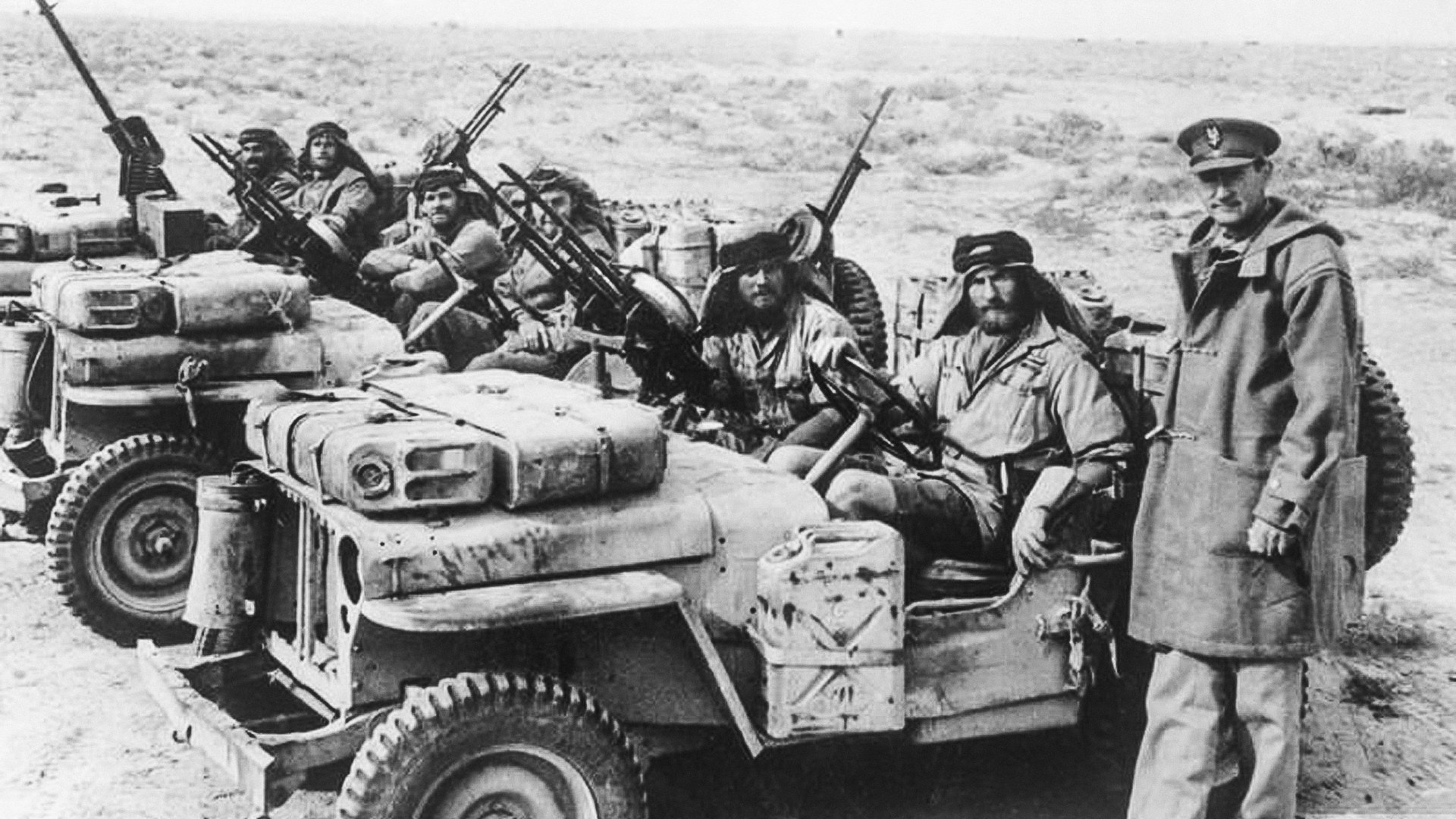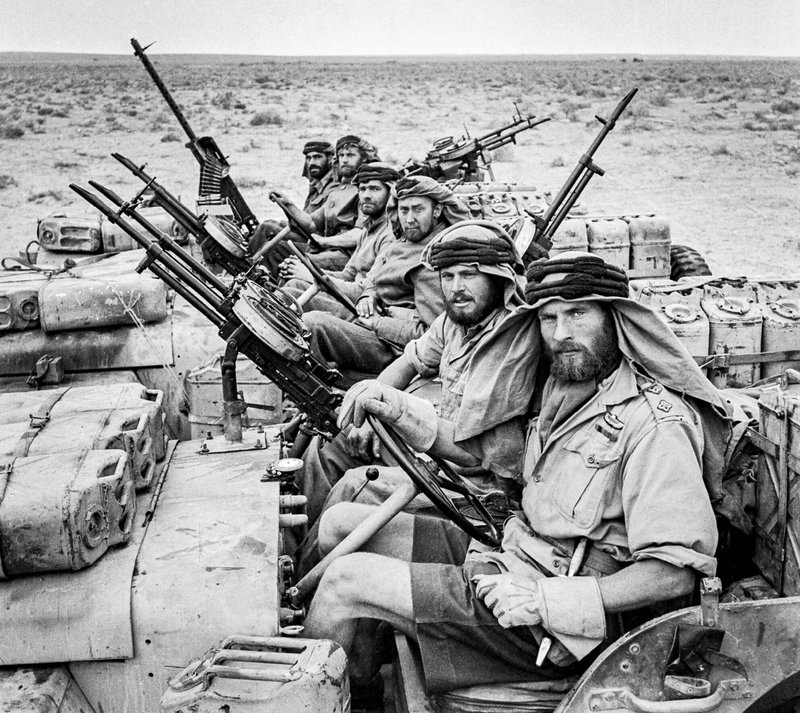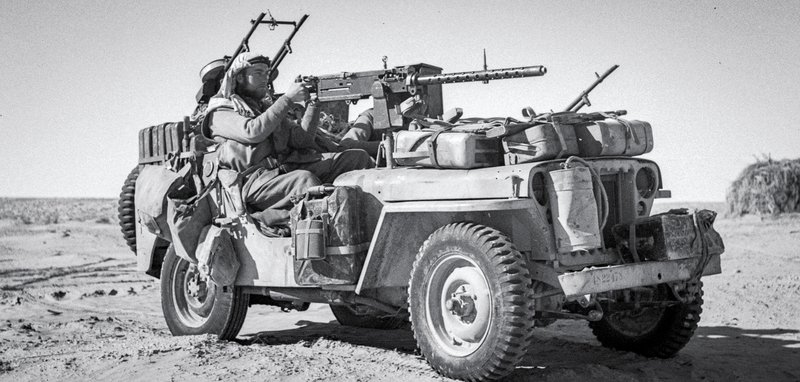
David Stirling (right) greets an SAS patrol on its return from a desert mission, 1942. Photo courtesy of the Imperial War Museums.
In the early months of 1941, British forces were struggling to check the advance of German tank commander Erwin Rommel and his Afrika Korps. Since arriving in the North African desert that February, the highly aggressive Rommel had led German armor in brazen assaults that forced the Brits nearly out of Libya and up against the Egyptian border. The Afrika Korps had also achieved air superiority, establishing several airfields strategically situated across the region.
Knowing that conventional tactics alone would not suffice in defeating Rommel, the British decided to mobilize the newly established Special Air Service (SAS). The elite unit’s first missions would be carried out by L Detachment — a group of approximately six officers and 60 enlisted men hand-picked by SAS co-founder Lt. David Stirling. As a commando outfit, they would be relied upon to conduct small-scale sabotage raids behind enemy lines and do so with minimal support, supplies, and equipment.

The SAS in North Africa in January 1943. Wikimedia Commons photo.
In November 1941, L Detachment spearheaded Operation Squatter, the first combat mission to ever involve the SAS. The operation would begin with L Detachment parachuting behind German lines in Libya ahead of a British offensive targeting a network of coastal airfields. A severe storm rolled in just as the operation was getting underway, but Stirling decided to stick with the plan. The decision proved catastrophic. Of the 55 SAS commandos who jumped into Libya, only about 20 would return to friendly lines still in fighting shape. The rest were either killed, injured, captured, or went missing.
After Operation Squatter, Stirling went back to the drawing board to figure out a more effective way for his commandos to operate in North Africa. He proposed ditching the unit’s airborne capabilities and transforming it into more of an unorthodox ground assault element, one that would rely on heavily armed Land Rovers to whisk small teams across the desert to conduct hit-and-run sabotage missions against German military installations along the coast.
Stirling ultimately decided to go with his plan. He recruited the Long Range Desert Group (LRDG) to provide transportation for his commandos. They would operate almost exclusively under the cover of darkness, moving swiftly with the goal of being on and off their target objectives before first light. Thus, over the next year, the SAS and LRDG criss-crossed Libya, carrying out a series of clandestine missions that succeeded in destroying as many as 400 enemy aircraft, hundreds of vehicles, and dozens of fuel supply dumps.

A member of the Long Range Desert Group in a heavily-armored Land Rover in 1943. Photo courtesy of the National Army Museum.
According to the National Army Museum in London, it was Stirling's German adversaries who first started calling him “The Phantom Major.” The British tabloid The Telegraph even once suggested that Rommel — known as the Desert Fox for the slyness of his tactics in Africa — came up with the nickname himself. However, in his recent book, David Stirling: The Phoney Major: The Life, Times and Truth about the Founder of the SAS, author Gavin Mortimer posits that the moniker was, in fact, coined by the British press as part of an effort to lionize Stirling and inspire confidence in his leadership.
As the war went on, the so-called Phantom Major’s legend grew. In January 1943, he was taken prisoner of war in Tunisia after locals betrayed his whereabouts to the Nazis. He managed to escape captivity only to be captured again by Italian troops. Eventually, he ended up in the infamous “escape-proof” Colditz Castle prison in Germany. He remained there until the end of the war, at which point he returned home to a hero’s welcome. He received many accolades for his wartime services, including being appointed a knight bachelor by Queen Elizabeth II.
Read Next: How The British ‘Libyan Desert Taxi Service’ Committed Desert Piracy During World War II

Matt Fratus is a history staff writer for Coffee or Die. He prides himself on uncovering the most fascinating tales of history by sharing them through any means of engaging storytelling. He writes for his micro-blog @LateNightHistory on Instagram, where he shares the story behind the image. He is also the host of the Late Night History podcast. When not writing about history, Matt enjoys volunteering for One More Wave and rooting for Boston sports teams.
BRCC and Bad Moon Print Press team up for an exclusive, limited-edition T-shirt design!
BRCC partners with Team Room Design for an exclusive T-shirt release!
Thirty Seconds Out has partnered with BRCC for an exclusive shirt design invoking the God of Winter.
Lucas O'Hara of Grizzly Forge has teamed up with BRCC for a badass, exclusive Shirt Club T-shirt design featuring his most popular knife and tiomahawk.
Coffee or Die sits down with one of the graphic designers behind Black Rifle Coffee's signature look and vibe.
Biden will award the Medal of Honor to a Vietnam War Army helicopter pilot who risked his life to save a reconnaissance team from almost certain death.
Ever wonder how much Jack Mandaville would f*ck sh*t up if he went back in time? The American Revolution didn't even see him coming.
A nearly 200-year-old West Point time capsule that at first appeared to yield little more than dust contains hidden treasure, the US Military Academy said.












